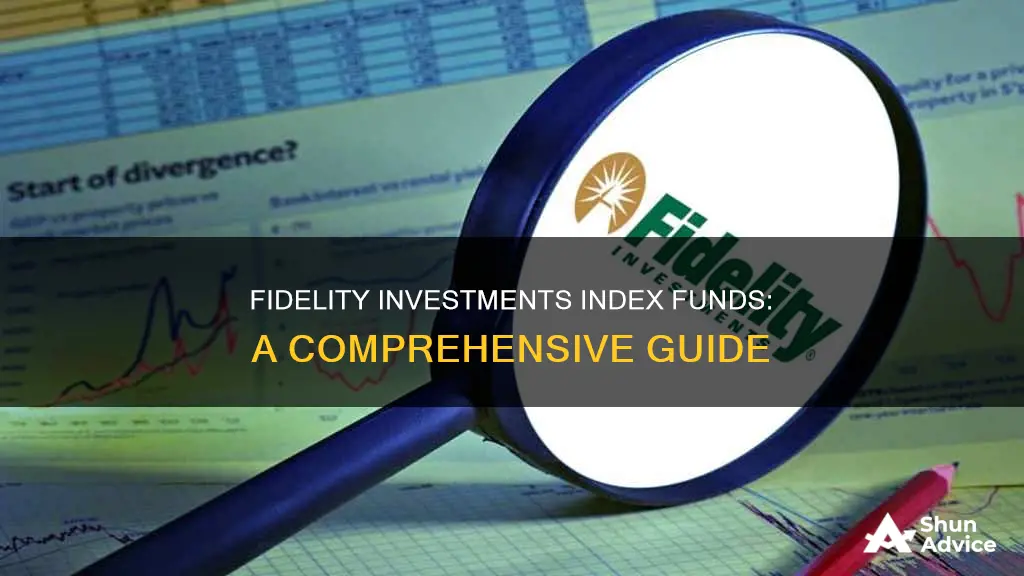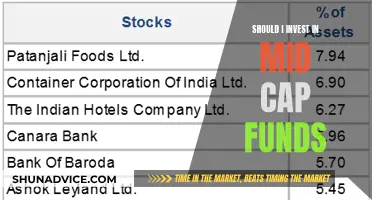
Fidelity Investments is a company that offers a range of financial services, including mutual funds and sector ETFs. One of the key advantages of investing with Fidelity is their low fees, with some funds having a 0% expense ratio. They also offer 24/7 customer service and have been named Barron's Best Online Broker multiple times. Fidelity's index funds aim to track the performance of a range of equity and fixed-income indexes, including U.S. stock market indexes, international equity indexes, and bond indexes. These funds provide investors with a diverse range of investment options, allowing them to create custom risk profiles to suit their financial goals.
| Characteristics | Values |
|---|---|
| Net Assets | $512.3 billion |
| Expense Ratio | 0.015% |
| Trailing 12-month (TTM) Yield | 1.4% |
| Inception Date | February 17, 1988 |
| Three-year Average Annual Return | 8.1% |
| Investment Type | S&P 500 index fund |
| Investment Objective | Provide low-cost access to a high-quality portfolio |
| Management Style | Passive, tracks the S&P 500 index |
| Top Holdings | S&P 500 companies |
| Minimum Investment | None |
| Account Fees | None |
| Customer Service | 24/7 online and phone support |
| Awards | Barron's Best Online Broker 2016, 2017, 2018 |
What You'll Learn

Fidelity's range of index funds
Fidelity offers a wide range of index funds that attempt to track the performance of a range of widely followed equity and fixed-income indexes. These include funds that seek to track U.S. stock market indexes across all market caps, as well as several international equity index funds, including an index fund dedicated to emerging markets. Fidelity also offers bond index funds, such as the Fidelity U.S. Bond Index Fund (FXNAX), which seeks to track the Bloomberg Barclays Indices.
- Fidelity 500 Index Fund (FXAIX): Tracks the S&P 500 index, providing access to a high-quality portfolio of the 500 largest and most successful public companies in the U.S. It has an expense ratio of 0.015% and an inception date of February 17, 1988.
- Fidelity Mid Cap Index Fund (FSMDX): Tracks the Russell Midcap Index, which includes the 800 smallest companies within the Russell 1000 index. It has an expense ratio of 0.025% and an inception date of September 8, 2011.
- Fidelity Small Cap Index Fund (FSSNX): Invests in Russell 2000 stocks, which include the 2,000 smallest public U.S. companies in the Russell Index. It has an expense ratio of 0.025% and an inception date of September 8, 2011.
- Fidelity Global ex-U.S. Index Fund (FSGGX): Uses sampling to mimic the performance of the MSCI ACWI (All Country World Index) ex USA Index, providing exposure to large-cap foreign stocks. It has an expense ratio of 0.055% and an inception date of September 8, 2011.
- Fidelity U.S. Bond Index Fund (FXNAX): Tracks the Bloomberg U.S. Aggregate Bond Index, investing primarily in U.S. Treasury debt, corporate bonds, and pass-through mortgage-backed securities. It has an expense ratio of 0.025% and an inception date of March 8, 1990.
- Fidelity International Bond Index Fund (FBIIX): Tracks the Bloomberg Global Aggregate ex-USD Float Adjusted RIC Diversified Index (USD Hedged), investing in government, corporate, and securitized bonds from developed and emerging markets. It has an expense ratio of 0.06% and an inception date of October 10, 2019.
- Fidelity Multi-Asset Index Fund (FFNOX): A blended fund that holds a set composition of domestic and international stock and bond funds, with an allocation of 24.2% developed market stocks, 10.3% emerging market stocks, 7.1% U.S. investment-grade bonds, 4.8% long-term U.S. Treasury bonds, and 3.1% international bond funds. It has an expense ratio of 0.06% and an inception date of June 29, 1999.
Fidelity also offers sustainable index funds, such as the Fidelity U.S. Sustainability Index Fund (FITLX) and Fidelity Sustainability Bond Index Fund (FNDSX), which allow investors to incorporate environmental, social, and governance (ESG) criteria into their investment strategies.
Vanguard Windsor II: Uncovering its Security Strategy
You may want to see also

Advantages of investing in index funds
Fidelity Investments is a mutual fund company that offers a wide range of index funds. These funds aim to track the performance of various equity and fixed-income indexes, including U.S. stock market indexes, international equity indexes, and bond indexes.
Low Costs and Management Fees
Index funds are passively managed, meaning they track a specific market index without actively picking and trading assets. This passive management leads to significantly lower management fees compared to actively managed funds. Index funds' expense ratios are typically below 0.20%, while actively managed funds often have expense ratios of 0.50% or higher. The low costs of index funds result from reduced research, trading, and management activities, which are passed on to investors as savings.
Broad Diversification
Index funds provide instant diversification by allowing investors to capture the returns of a large segment of the market in a single fund. For example, an index fund tracking the S&P 500 would hold about 500 different stocks, reducing the risk of losing money. Diversification ensures that the value of an investor's portfolio is not overly dependent on the performance of any single company or a small group of companies.
Attractive Returns
Index funds have historically outperformed actively managed funds over the long term. Even renowned investors like Warren Buffett have endorsed index funds, highlighting their ability to generate attractive returns. According to research, only about 23% of actively managed mutual funds outperform the S&P 500 over five years. This underperformance of actively managed funds justifies the preference for index funds, which offer high returns at a low cost.
Tax Efficiency
The passive nature of index funds results in lower turnover ratios compared to actively managed funds. Lower turnover ratios mean fewer trades, reducing capital gains distributions passed on to shareholders. Consequently, index funds offer tax advantages by minimising taxes owed by investors on capital gains.
Consistency in Achieving Investor Goals
Index funds enable investors to achieve their goals relative to benchmarks more consistently. For example, investing in a low-cost S&P 500 ETF provides a higher likelihood of beating the market without the risk of a fund manager making poor stock selections. The consistency of index funds in meeting investor goals makes them a preferred choice for many.
Index funds, including those offered by Fidelity Investments, provide a range of benefits such as low costs, diversification, attractive returns, tax advantages, and consistency in achieving investor goals. These advantages contribute to their popularity among both experienced and novice investors.
Global Equity Funds: Diversification and Growth Opportunities
You may want to see also

Fidelity's management experience
Fidelity has been managing index funds for over 30 years and currently offers 28 equity, fixed income, and hybrid index mutual funds, 13 Fidelity Freedom Index Funds, and 21 passive ETFs. Fidelity's management experience is focused on delivering strong investment performance and providing clients with a range of investment options to suit their needs.
Fidelity's approach to managing index funds is centred on minimizing tracking error, which is the deviation of an index fund's performance from its target index. They employ solid trading techniques and statistical sampling and optimization techniques to replicate the performance of the target index as closely as possible. This focus on tracking benchmark performance has helped Fidelity build a strong reputation in the industry, with their index funds being recognized for their low costs and strong performance.
Fidelity's management team understands the needs and goals of their clients. They recognize that investors are looking for low-cost investment options that provide broad market exposure and strong returns. By leveraging their management experience and expertise, Fidelity is able to offer a diverse range of index funds that cater to different risk profiles and investment themes. Whether investors are looking for broad market exposure or targeted niche investments, Fidelity's management experience enables them to provide a wide array of choices.
In addition to their strong performance and diverse offerings, Fidelity's management experience also shines through in their commitment to sustainability. They offer a range of sustainable index funds, including the Fidelity U.S. Sustainability Index Fund, Fidelity Sustainability Bond Index Fund, and Fidelity International Sustainability Index Fund. These funds allow investors to align their investments with their values and contribute to positive environmental and social impact.
Maximizing TFSA Investments: Strategies for Smart Financial Planning
You may want to see also

Comparison to Vanguard Index Funds
Fidelity and Vanguard are two of the most well-known investment companies offering index funds. Both companies offer a wide range of index funds that track various financial market indexes, such as the S&P 500 or the Nasdaq. However, there are some key differences between the two companies and their offerings.
Company Structure and Ownership:
Vanguard has a unique structure where its funds own the company, and investors own the funds. This means that Vanguard does not have any outside owners and is not influenced by the demands of private owners or other outside interests. Fidelity, on the other hand, is a privately-owned company.
Cost and Expense Ratios:
Vanguard's average expense ratio across its index mutual funds and ETFs is 72% less than the industry average. Fidelity also offers some of the lowest prices in the industry for its index mutual funds. While the exact expense ratios may vary depending on the specific fund, both companies offer low-cost options.
Performance and Returns:
Vanguard claims that 87% of its index mutual funds and ETFs have performed better than their peer-group averages over the last 10 years. Fidelity, while not providing specific performance metrics, emphasizes its management experience and focus on tracking benchmark performance to deliver results for its clients.
Diversification and Investment Options:
Both Vanguard and Fidelity offer a wide range of index funds that cover various market segments, including broad-based funds that track the entire U.S. stock market and more narrow funds that focus on specific sectors or market caps. Vanguard highlights the benefit of lower risk through broader diversification, as their index funds contain a preselected collection of hundreds or thousands of stocks and/or bonds. Fidelity also offers a range of choices, including U.S. stock market indexes of all market caps and several international equity index funds.
Customer Service and Support:
Fidelity emphasizes its commitment to customer service, with 24/7 online and phone support. While Vanguard also provides customer support, the specific details of their availability are not mentioned.
In summary, both Vanguard and Fidelity offer competitive index funds with low expense ratios and a wide range of investment options. Vanguard's unique company structure and impressive performance metrics may be appealing to some investors, while Fidelity's customer service and management experience could be advantageous to others. Ultimately, the decision between the two depends on various factors, including an investor's specific financial goals, risk tolerance, and investment preferences.
Investment Banks: Hedge Fund Behavior in 2008?
You may want to see also

Fidelity's sector ETFs
Historically, different industry sectors have exhibited varying risk/reward characteristics. The technology sector, for example, tends to be the most volatile over time, while the utility sector is typically the least volatile. Individual sectors can exhibit greater volatility than the overall stock market.
Fidelity offers a range of sector ETFs that cover all 11 sectors of the US equity market. These include:
- Fidelity MSCI Communication Services Index ETF (FCOM)
- Fidelity MSCI Consumer Discretionary Index ETF (FDIS)
- Fidelity MSCI Consumer Staples Index ETF (FSTA)
- Fidelity MSCI Energy Index ETF (FENY)
- Fidelity MSCI Financials Index ETF (FNCL)
- Fidelity MSCI Health Care Index ETF (FHLC)
- Fidelity MSCI Industrials Index ETF (FIDU)
- Fidelity MSCI Information Technology Index ETF (FTEC)
- Fidelity MSCI Materials Index ETF (FMAT)
- Fidelity MSCI Real Estate Index ETF (FREL)
- Fidelity MSCI Utilities Index ETF (FUTY)
These ETFs are indexed to the MSCI® USA Investable Market Index (IMI) Sector Indices, which include large-, mid-, and small-cap US stocks, covering up to 99% of the free-float-adjusted market capitalization of the US equity market.
Hedge Fund Managers: Key Investment Factors
You may want to see also
Frequently asked questions
An index fund is a mutual fund whose portfolio aims to match the risk and return of a market index, such as the S&P 500. The goal is not to outperform the index but to mirror its activity.
Fidelity index funds use a benchmark index to define their holdings, rather than relying on a management team to hand-pick assets. This means they require less human capital to manage and therefore have lower expense ratios.
Index funds are popular among experienced and novice investors due to their low costs and built-in diversification. They also have wide-ranging investment themes, so they can be combined in different ways to create custom risk profiles.
Some examples of Fidelity index funds include the Fidelity 500 Index Fund (FXAIX), the Fidelity Mid Cap Index Fund (FSMDX), and the Fidelity Small Cap Index Fund (FSSNX).
Yes, Fidelity index funds are suitable for long-term investing because they have diversity, low expense ratios, and popular investment themes.







